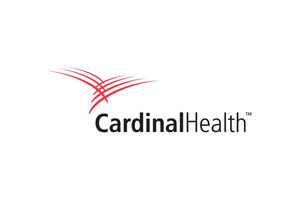New Research Proves Clinical Pathways Can Reduce Cancer Care Costs and Improve Quality While Increasing Physician Reimbursement
Cardinal Health Specialty Solutions Shares Powerful New Cancer-Care Research at 2013 American Society of Clinical Oncology (ASCO) Annual Meeting
DUBLIN, Ohio, May 21, 2013 /PRNewswire/ -- With the cost of cancer care projected to increase to $170 billion by 20201, many in the healthcare industry are looking for ways to curb that cost curve – while maintaining quality of care for cancer patients and preserving fair compensation for physicians. New research being featured later this month in poster presentations and abstracts at the 49th Annual Meeting of the American Society of Clinical Oncology (ASCO) proves that it is possible to meet all three of these seemingly contrary goals.
Cardinal Health Specialty Solutions and CareFirst BlueCross BlueShield (CareFirst), one of the largest health insurers in the Mid-Atlantic, recently completed a series of studies on the effectiveness of the nation's first clinical pathways program for oncology, which they jointly launched in 2008. Physicians within the CareFirst network worked together to develop clinical pathways – or evidence-based treatment regimens – for the treatment of breast, lung and colon cancers.
The new research shows that through the use of the Clinical Pathways program, CareFirst reduced its overall costs for treating breast, lung and colon cancers by 15 percent. These savings were primarily achieved through a 7 percent decline in emergency room visits, shorter lengths of stay in the hospital, increased use of generic medications and more appropriate use of chemotherapy. Although the overall drug spend was reduced, the reimbursement to physicians increased for both branded and generic drugs, and physicians received higher reimbursement overall.
The authors of the research contend that payor-physician collaboration was a significant factor behind the success of this Clinical Pathways program.
"These positive results prove that when implemented collaboratively, with physician input and buy-in, our Clinical Pathways can create a new paradigm for the delivery of cancer care – one in which all stakeholders can win," said Bruce Feinberg, D.O., vice president and chief medical officer of Cardinal Health Specialty Solutions.
Feinberg explained that these Clinical Pathways were created by and for physicians within the CareFirst network, not by an outside entity. He also asserts that this collaboration was a leading factor for the program's high rate of physician participation and 95 percent pathways compliance rate. For example, participating physicians were less likely to administer complex chemotherapy in late-line treatment, and when clinical evidence did not support it.
Attendees of the 2013 ASCO Annual Meeting can learn more about this research by visiting Cardinal Health Specialty Solutions' booth #4026, or by attending one of Dr. Feinberg's poster presentations (times listed below). Full abstracts of this research are available at abstract.asco.org.
Cardinal Health Specialty Solutions and CareFirst poster presentations at the 2013 ASCO Annual Meeting:
Title: Validation of observed savings from an oncology clinical pathways program.
Monday, June 3, 2013; 1:15-5:15 p.m.; S Hall A2 (Abstract #6553)
Author(s): J. A. Scott, S. Milligan, W. Wong, D. Winn, J. Cooper, N. Schneider, S. Parkes, B. A. Feinberg
Title: Shifting revenue from drug sales to cognitive services: Impact on physician prescribing behavior. Monday, June 3, 2013; 1:15-5:15 p.m.; S Hall A2 (Abstract #6629)
Author(s): B. A. Feinberg, J. Cooper, W. Wong, D. Winn, T. Olson, R. S. Trehan, J. A. Scott
Cardinal Health Specialty Solutions and CareFirst abstracts at the 2013 ASCO Annual Meeting:
Title: Oncology Medical Home: Payer Return on Investment. (Abstract #e17582)
Authors: W. Wong, J. Cooper, D. Winn, T. Olson, R. Trehan, J.A Scott, B.A Feinberg
Title: Potential Cost Savings of a Continuous Quality Improvement Program as Part of an Oncology Medical Home. (Abstract # e17579)
Authors: D. Winn, W. Wong, J. Cooper, T. Olson, R.S. Trehan, J.A. Scott, B.A. Feinberg
Title: Financial Impact of an Oncology Medical Home on Participating Providers. (Abstract #e17581)
Authors: R. Trehan, W. Wong, D. Winn, J. Cooper, T. Olson, J.A. Scott, B.A. Feinberg
About Cardinal Health Specialty Solutions
Cardinal Health Specialty Solutions provides regulatory, clinical, reimbursement, technology and distribution services to help health care professionals, payors and pharmaceutical and biotech companies improve the quality and cost-effectiveness of caring for patients who are managing complex diseases. Cardinal Health Specialty Solutions partners with customers to alleviate day-to-day administrative burdens, optimize business functions and to implement new innovations that move their businesses forward. To learn more, visit www.cardinalhealth.com/specialtysolutions.
About Cardinal Health
Headquartered in Dublin, Ohio, Cardinal Health, Inc. (NYSE: CAH) is a $108 billion health care services company that improves the cost-effectiveness of health care. As the business behind health care, Cardinal Health helps pharmacies, hospitals, ambulatory surgery centers and physician offices focus on patient care while reducing costs, enhancing efficiency and improving quality. Cardinal Health is an essential link in the health care supply chain, providing pharmaceuticals and medical products to more than 60,000 locations each day. The company is also a leading manufacturer of medical and surgical products, including gloves, surgical apparel and fluid management products. In addition, the company supports the growing diagnostic industry by supplying medical products to clinical laboratories and operating the nation's largest network of radiopharmacies that dispense products to aid in the early diagnosis and treatment of disease. Ranked #19 on the Fortune 500, Cardinal Health employs more than 30,000 people worldwide. More information about the company may be found at cardinalhealth.com and @CardinalHealth on Twitter.
1 Fisher E, Goodman D, Skinner J, Bronner K. Health care spending, quality, and outcomes: more isn't always better. The Dartmouth Institute for Health Policy and Clinical Practice.
SOURCE Cardinal Health
WANT YOUR COMPANY'S NEWS FEATURED ON PRNEWSWIRE.COM?
Newsrooms &
Influencers
Digital Media
Outlets
Journalists
Opted In





Share this article